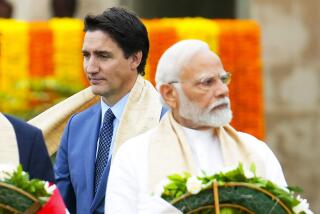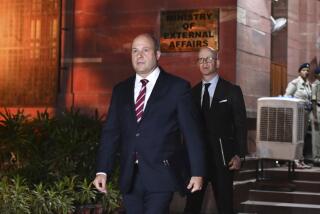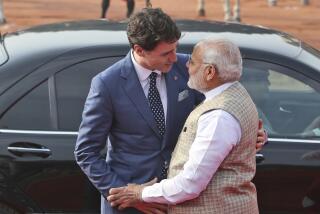Canada Hunts for Nazi War Criminals, but Critics Question Commitment
- Share via
OTTAWA — Canada has taken a leadership role in finding and prosecuting Nazi war criminals, even though right after World War II the country was thought to provide a haven for those it now seeks.
In fact, some experts suggest the current investigation is bogged down in bureaucracy because the government is not committed to bringing war criminals to justice.
“I appreciate the fact those cases can take an enormous amount of time to put together, but one has to balance the fact it takes time against the fact that time is wasting,” said Harvard University lawyer Allan Ryan, former head of the U.S. Special Office of Investigations, established in 1979 to gather evidence against suspected war criminals in the United States.
Ryan applauded a Canadian government move last June empowering courts to try suspected war criminals.
Canada is the only Western nation to give courts such power, although others, including Australia and Britain, are considering similar moves. Congress also is investigating the possibility.
Canada’s decision followed a 23-month investigation by Quebec Judge Jules Deschenes and a team of lawyers and researchers.
The $3.2-million inquiry investigated 936 accusations and closed files on 698 because the individuals had died or there was insufficient evidence.
A commission report in March, 1987, isolated 238 cases for further investigation, including 20 that required urgent action involving either criminal prosecution or denaturalization and deportation.
About one-quarter of those were related to German scientists and technicians admitted to Canada in the late 1940s under a plan called Operation Matchbox, devised by Allied nations eager for German expertise.
Sol Littman, Canadian representative of the Friends of Simon Wiesenthal Center for Holocaust Studies, said a 1984 Royal Canadian Mounted Police report indicated the Canadian government knew the backgrounds of many war criminals but admitted them regardless.
Littman estimated as many as 3,000 war criminals and collaborators entered Canada, including Count Jacques de Bernonville, the right-hand man of Gestapo chief Klaus Barbie. He later fled to Brazil.
In the 13 months after Deschenes’ report, police charged Imre Finta, a former Toronto restaurateur, with war crimes. It moved to denaturalize alleged Nazi collaborator Jacob Luitjens to allow deportation to the Netherlands.
Finta, 76, a former Hungarian police captain, was charged with sending 8,615 Jews from Hungary to Nazi labor and death camps in 1944. He also faces manslaughter charges in the deaths of an unspecified number of Jews. A preliminary hearing is scheduled for September.
Apparent delays in returning indictments against any of the other urgent cases puzzle Ryan and members of Canada’s Jewish community.
“There’s been one indictment returned--that’s better than none but not as good as two,” said Ryan, whose department was responsible for denaturalizing and deporting about 12 suspected war criminals over four years. “I would feel much better judging output than intentions.”
Milton Harris, past president of the World Jewish Congress, said the commission collected sufficient evidence to proceed to trial with the 20 most urgent cases.
“The track record of the Department of Justice has not been good,” he said, but added he was assured by government officials investigation of suspected war criminals “is still a priority issue.”
Unlike the highly specialized U.S. operation, the Canadian government is using about 40 people from the justice department and Royal Canadian Mounted Police to collect evidence from a number of East Bloc countries.
Finding appropriate people has taken time because investigators and researchers must have working knowledge of foreign languages and archival skills.
Littman said Canada has wasted precious time negotiating formal agreements to allow investigators to collect evidence from the Soviet Union, Israel and the Netherlands.
“The Americans, West Germans and Dutch, who maintain a standard of justice equal to ours, have been conducting trials for alleged war criminals for many years without similar treaties,” Littman said.
“Continued delay means that many of those who deserve to be brought to justice will be dead by the time the Justice Department is ready to move on them, and others will have fled the country.”
Justice Department spokeswoman Madeleine Asch said the Royal Canadian Mounted Police has undertaken investigation of most of the cases identified by Deschenes.
More to Read
Sign up for Essential California
The most important California stories and recommendations in your inbox every morning.
You may occasionally receive promotional content from the Los Angeles Times.













